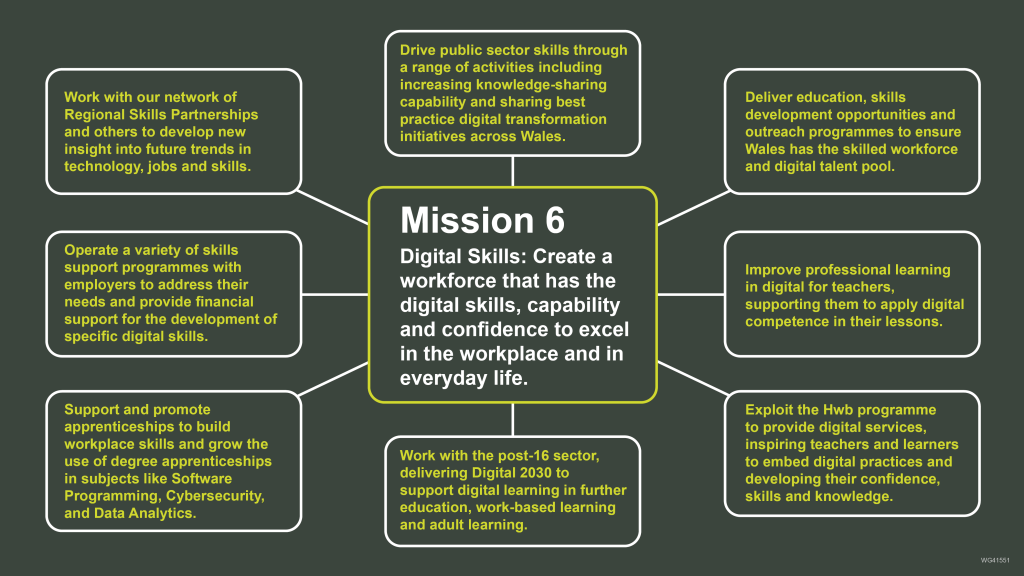Digital Strategy for Wales: Mission 6 – Digital Skills
Post by Huw Morris, Director for Skills, Higher Education and Lifelong Learning
This is the last in our series of blogs about the missions in our digital strategy. But it is by no means the least. Digital skills and competency are vital to all aspects of this strategy, developing people’s confidence to use digital in everyday life, to lead digital transformation across our public services and in improving job prospects. This is why improving digital skills underpins the whole of our strategy.
Looking back over the first 5 missions, we can see how integral digital skills are to all that we want to achieve. In Mission 1, we recognised that people’s digital skills were crucial to the delivery of digital public services. Mission 2 outlined how the development of higher level digital skills are key to the growth of the digital economy. Furthermore, the pandemic has shown that digital competency and confidence are not just for the workplace. This mission builds on the actions outlined in Mission 4 on digital inclusion. We want people to develop confidence and skills from an early age so that they can make the most of digital tools and technologies in their lives and in the workplace.
In 2019, the Brown Review identified the challenges and opportunities to the future workforce in Wales as automation and digital innovation progress. The final report described a race against time for Wales to take the lead in digital innovation and to make sure that we have the right skills in place to capitalise. The pandemic has accelerated the pace of this change.
Digital skills are now being required by employers in occupations across all skill levels. According to the No Longer Optional: Employer Demand for Digital Skills report, published June 2019, even amongst low-skill jobs, three quarters of postings are in digital occupations and 70% of all job roles require some form of digital skills.
In addition, the Welsh Government’s Digital 2030 Framework describes how digital competencies and confidence should be embedded in all learning, giving people the best start and equipping them to enter the workforce. We also want to make sure that people can be supported to upskill and retrain as they need throughout their lives.
Our ambition is to develop digital skills in children from the earliest possible age and to provide all learners with high level digital skills, ensuring our young people are digitally competent and evolve into enterprising, creative and critical thinkers. Our Digital Competence Framework means that digital competence is integrated across the curriculum and is treated like literacy and numeracy.
To support the digital curriculum, the Welsh Government has developed Hwb, a programme for improving the use of digital technology for teaching and learning in schools. We want to exploit the transformational benefits of Hwb, demonstrating the positive impact which digital and technology can have on education.
Our Digital Strategy is designed to support these aims. That is why our sixth Mission is to create a workforce that has the digital skills, capability and confidence to excel in the workplace and in everyday life.
So, what will we do?
What will be different?
Our aim is to deliver this set of outcomes:
- Citizens and businesses will be digitally confident and able to take full advantage of the opportunities that digital technologies can offer.
- Young people have the opportunity to be digitally competent and evolve into enterprising, creative and innovative thinkers with good prospects for rewarding jobs
- Organisations deliver services based on user needs, making informed and effective decisions and developing a digital and data culture.
- Professionals in Wales have greater confidence in delivering digital public services, including teachers and GPs, because they have the necessary digital skills.
- Businesses in Wales have the confidence and vision in business planning to develop competitive business models that make the most of opportunities associated with digital technology, and that can engage with the high skilled talent pool that has been developed in Wales.
- Businesses invest in their workforce as they recognise the value that digital skills bring.
- Talent is developed and retained across public, private and third sectors in Wales.
A plan for delivery
As described in our earlier blogs, to achieve these outcomes we need a clear plan for delivery. Work has already taken place to identify some of the actions that are needed and what needs to change. These actions in this Digital Strategy will support the activity which are being taken forward as part of the economic recovery. This is our first iteration of a delivery roadmap for this mission. It will be a living document and progress against them will be monitored and reported.
Getting your feedback
We’d love to hear what you think about our ambitions in this mission, the outcomes we want to achieve and how we plan to deliver them. For example:
- Do you think that these are the right outcomes?
- What do you think the barriers might be?
- Do you think there are any gaps and, if so, what are they?
- If you had to prioritise, what would your top 3 priorities be?
We would like to hear your views, you can do this by filling in the online form or responding in the comments section of this blog. The online form and comments will be open until the end of January 2021.
While we will not be responding to each individual comment, rest assured we will be taking all feedback into account when developing the Digital Strategy for Wales.
Our next, and final blog in this series, will summarise the feedback we’ve received and next steps for developing the final version which will be published in the Spring.


